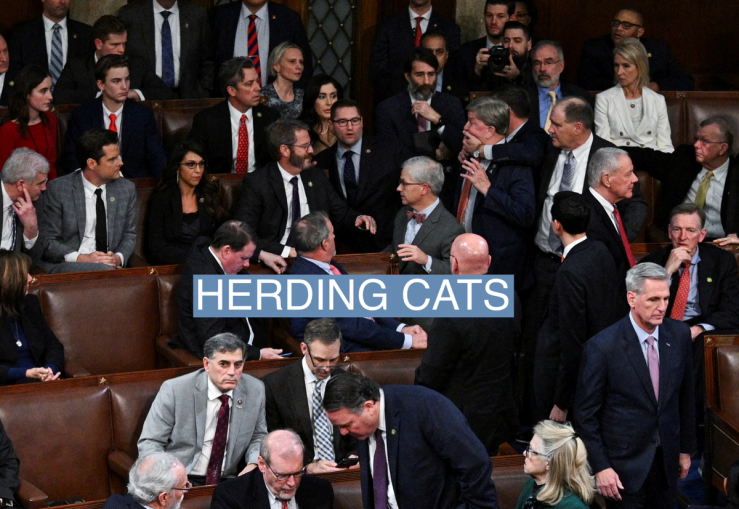The News
As the U.S. government hits its $31.4 trillion borrowing limit today, Wall Street’s Washington veterans are sounding the alarm that after years of brinkmanship, the possibility of an unprecedented default is real this time.
Treasury Secretary Janet Yellen told Congress today that the department will start employing “extraordinary measures,” like pausing investments in retirement funds for civil servants, to keep the government running. Unless the debt ceiling is raised or suspended by lawmakers, those measures could last until possibly the summer.
One Wall Street lobbyist said his firm hasn’t started tabletop exercises yet to game out scenarios but when they do, he will recommend including political twists that result in wild market gyrations given the current mood in Washington.
U.S. House Speaker Kevin McCarthy’s tenuous control over his Republican caucus and the stated refusal from Democrats to negotiate over the limit has left people like Tobin Marcus, senior U.S. policy and politics strategist at Evercore ISI, believing “there’s a non-zero possibility of an actual disaster here.”
Marcus was an advisor to then-Vice President Joe Biden during the 2011 debt standoff that rattled markets and spurred S&P to downgrade the U.S. credit rating for the first time. His warnings about the current fight are partly aimed at his colleagues on Wall Street who believe an eventual, “rational” decision will be made and a crisis will be averted.
This line of thinking, said Jeff Siegel, head of U.S. public and regulatory policy at BNP Paribas and a former Senate staffer, miscalculates what motivates politicians.
“There’s a disconnect between how Wall Street views big decisions and how Washington actually makes big decisions. Political decisions can often be disconnected with rationality and that always has been a problem for how corporate America and Wall Street view these debt ceiling debates” said Siegel, who added “there’s probably never been a greater chance” the country defaults than this year.
That’s pushing some Wall Street lobbyists to act sooner than they have in past debt ceiling fights. One of them told Semafor that his game plan, for now, is to try to educate members, particularly those on the House Financial Services Committee, about the consequences of defaulting.
He’ll become more dire in his warnings as spring approaches but his biggest worry is that past predictions about an economic crisis due to a debt default, which persuaded some lawmakers to compromise in the past, won’t hold sway anymore.

In this article:
Bradley’s view
Markets haven’t reacted negatively to any of the piecemeal reporting so far, and despite warnings from people like Marcus and Siegel, traders are more interested in economic data releases and earnings reports right now.
“Investors are wary of paying too much attention to this,” said Michael Pinkerton, an analyst at T. Rowe Price and former staffer on the Senate Finance Committee.
Even though the GOP has moved away from big business, the stock market still acts as a talisman for Republicans who are quick to brag about the gains during Donald Trump’s presidency.
A prolonged slump thanks to default jitters would bring people to the table quickly, several Washington veterans said. The feedback loop between what happens in Congress and what happens in the markets needs to sync up, as one person framed it.
But that’s only half the battle. Avoiding a default requires McCarthy to get his caucus in line — easily the biggest concern of the half-dozen people we spoke to. For all the criticisms Senate Republican Minority Leader Mitch McConnell receives from those in his own party, he is often able to get his members in line when push comes to shove.
So far, no one has any confidence in McCarthy to do the same.
Room for Disagreement
Others are being more sanguine about the debt ceiling fight. Libby Cantrill, head of public policy at PIMCO, told Politico’s Morning Money that the bond trader believes there will be enough votes for a debt ceiling increase without strings attached and isn’t too worried about a default.
Meanwhile, Harvard economist Ken Rogoff told Semafor that the issue is an “empty threat.”
Notable
- GOP strategist Liam Donovan said in a conversation with The New York Times columnist Ross Douthat the lesson learned by Tea Party Republicans following the 2011 stand-off was “if they fight, they win” while Biden’s was to not negotiate and encourage “hostage-taking.” The differing views make this year’s game of chicken that much more tense.
- After serving in the trenches in the 2013 debt ceiling debate, former Treasury Secretary Jack Lew wrote about why the ceiling should be abolished in a 2017 essay in the Harvard Journal on Legislation.

